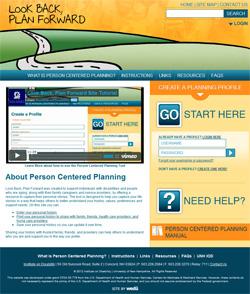Within a person-centered system, individuals and providers work in full partnership to guarantee that each person’s values, experiences and knowledge drive the creation of an individualized plan as well as the delivery of services and supports. Person Centered Planning (PCP) is recognized as an important vehicle for empowering individuals to have a voice in the planning process and actively shape their futures. Although rhetoric often indicates service planning is “highly individualized” and “person-centered,” the reality is that most formats currently used are inefficient vehicles for this purpose because they are aimed at fitting people to a standardized set of services or programs to meet identified needs, not at promoting creative planning and problem solving.
Most person-centered planning (PCP) tools used with persons with developmental disabilities focus on generating information, clarifying a vision for their future, and brainstorming capacities within the community. Yet, for many older adults, the focus on planning is not about clarifying a vision for the future but planning to maintain their independence; maintain connections to community, family, and friends; and receive support in a manner that respects their values and preferences. NH utilizes the Team Performance Model (TPM) developed by Drexler and Sibbet (1993), as its framework for PCP. The TPM offers a structure for supporting PCP that reflects predictable phases of planning and decision-making that individuals, families and support teams progress through as they design and develop individually-tailored supports.
As part of this three-year $500,000 grant from the U.S. Department of Health and Human Services, Centers for Medicare and Medicaid Services, the PCP project includes the development of principles of PCP, training for community staff who work in critical pathways to long-term supports, the development of a training manual, and the development of web-based PCP tools.
Look Back, Plan Forward

Look Back, Plan Forward was created to support individuals with disabilities and people who are aging; along with their family caregivers and service providers, by offering a resource to capture their personal stories. The tool is designed to help you capture your life stories in a way that helps others to better understand your history, values, preferences and support needs.
On the site you can:
- Enter your personal history.
- Print your personal history to share with family, friends, health care providers, and home care providers.
- Save your personal history so you can update it over time.
- Sharing your history with trusted family, friends, and providers can help others to understand who you are and support you in the way you prefer.
Look Back, Plan Forward was developed under grant CFDA 93.779 from the U.S. Department of Health and Human Services, Centers for Medicare & Medicaid Services.